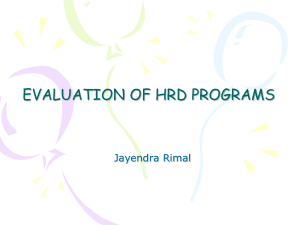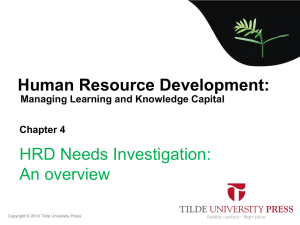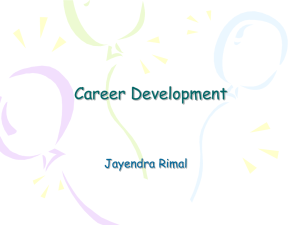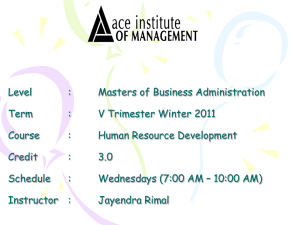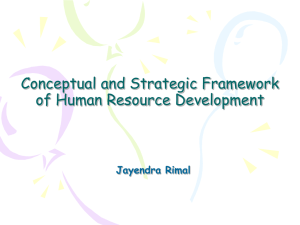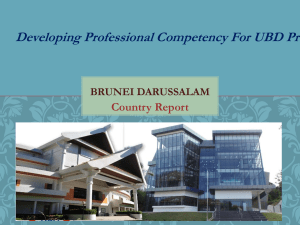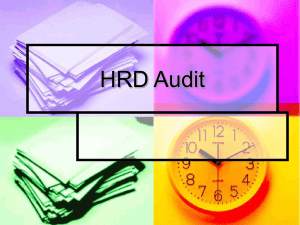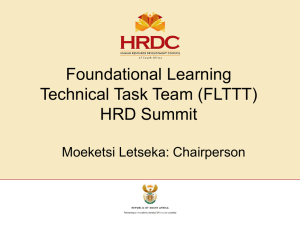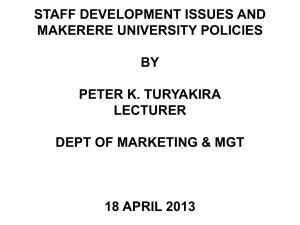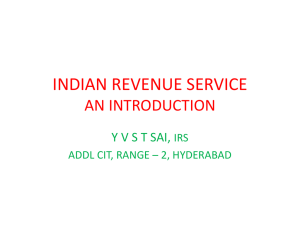Emerging Concepts of HRD
advertisement
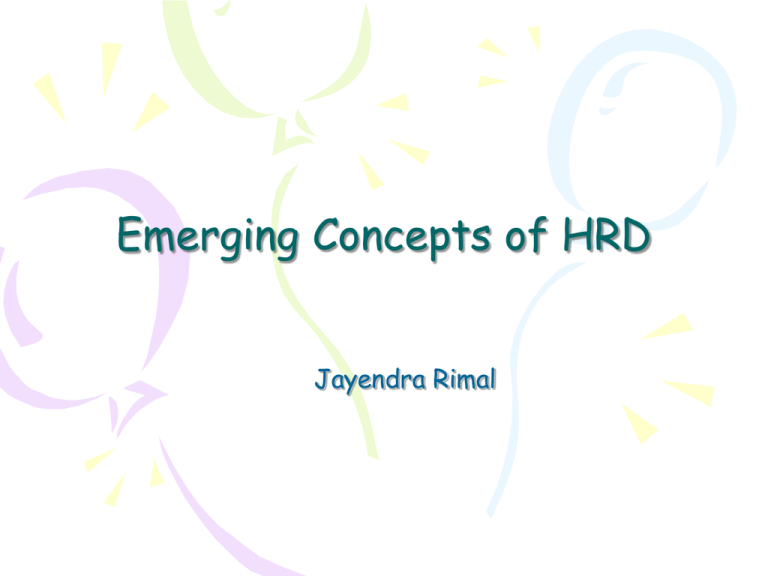
Emerging Concepts of HRD Jayendra Rimal Introduction o Training – Systematic and short term acquisition of knowledge, skills and attitude to bring someone to a desired standard or efficiency by instruction or practice o Education - Exposure to planned learning activities to train the mind. A development process affecting knowledge and abilities including character, culture, aspirations and achievements o Learning – Acquiring knowledge of or skill in something by study, experience or being taught – a never ending process of personal unfolding o Development – Realization of potential through activities and supporting processes which positions people for medium and long term opportunities o Emerging key words – Learning organizations, development strategy, change agent skills, knowledge workers 18/01/2012 Jayendra Rimal/Ace HRD 2 Recent Approaches o Design, delivery and resourcing of learning interventions and opportunities within organizations with the aim to enhance the contribution of individual employed in order to secure an organization’s skill base. o The integrated use of training and development, organization development and career development to improve individual, group and organizational effectiveness. o Emphasis on the development of comprehensive, coordinated and dynamic approaches for major learning initiatives within and outside an organization to order to facilitate the achievement of corporate objectives in a competitive environment. 18/01/2012 Jayendra Rimal/Ace HRD 3 Findings from Research of 20 leading Companies (Ghosal and Barlett, 1998) o Individual initiative is encouraged. Skills are developed through training. o Creation and leveraging of knowledge takes place through organizational learning, with new career paths, investment, teamwork, action learning and networking to ensure knowledge transfer. o There is continuous renewal through challenge imposed internally; refinement balanced with regeneration and knowledge is used to supplement strategic fit with strategic challenge o Contracts of compliance and control are replaced with commitment and initiative based on learning and self-confidence o Individual competence are developed based on appropriate knowledge, skills and attitudes of front-line, middle and top managers o Transformational processes are managed by developing new leaders 18/01/2012 Jayendra Rimal/Ace HRD 4 Emerging Concepts Some of the trends that can be discerned in HRD practice and theory: i. Talent Management and Leadership Development - A preoccupation of those at the top and concerned with succession planning while ensuring that each senior position has one or two candidates ready to fill it. ii. The connection to corporate strategy – The need to position HRD as a strategically important partner by giving it the same level of importance as other functions. Need for learning that emerges from the strategic directions and aims. Development of people can also influence strategy. Hence important to determine the type of learning that will contribute directly to the objectives of the organization. 18/01/2012 Jayendra Rimal/Ace HRD 5 Emerging Concepts, contd… iii. Clarifying who benefits from learning – Why should organizations provide individuals with transferable skills which enhances their marketability? In order to build skills and capacities through: o o o o o The use of systematic & planned training activities Adopting a policy of continuous development Creating maintaining a learning organization Ensuring that all training activities are performance related Paying particular attention to management development and career planning iv. Individual Development: Coaching and Mentoring – Organizations are using coaching and mentoring as part of an integrated strategy of change combined with other HRD interventions. 18/01/2012 Jayendra Rimal/Ace HRD 6 Emerging Concepts, contd… v. HRD as a Business Partner – As the rationale for action of HRD is similar to other departments, it contributes to the mission of the organization while adding value by collaborating in supporting the goals and projects of the organization. vi. Visionary and Transforming Leadership – Leadership has a central position in the development of all types of organizations. Helping to develop catalytic and enabling leadership seems to be an important component of HRD. vii. E-Learning: Integration of IT and HR – Face to face learning combined with e-learning with the recognition that certain learning need to be face to face – including social skills and team work. 18/01/2012 Jayendra Rimal/Ace HRD 7 Emerging Concepts, contd… viii. The broadening of HRD constituency – Concerns non-employee development (other stake holders) ix. The extension into team learning – Facilitating self managed teams, outdoor training to entire management team, quality circles for problem solving x. The incorporation of organizational development – Undertaking large scale change efforts by utilizing the services of external consultants xi. The incorporation of career development – Individuals taking responsibility for own learning resulting in careers being self managed 18/01/2012 Jayendra Rimal/Ace HRD 8 Emerging Concepts, contd… xii. Emphasis on internal consultancy – The usage of internal consultants for providing performance and facilitation support by connecting it with learning issues. xiii. Focus on organizational learning – Emphasis on processes contributing to learning by creating organizational learning climate contributing to people’s willingness to learn and transfer learning to the workplace. xiv. The link to knowledge management – Deals with the organization’s intellectual capital. Distinction between explicit and tacit knowledge. It also facilitates knowledge and skill acquisition, development and retention. 18/01/2012 Jayendra Rimal/Ace HRD 9 Key Challenges for Organizations o Compete successfully o Improve quality and increase productivity o Improve customer service o Lower costs o Adapt to fast changing technology o Achieve more with less o Become more flexible o Manage diverse and mobile workforce o Prevent obsolescence 18/01/2012 Jayendra Rimal/Ace HRD 10 Wake up Call o The emerging rationale now is on workplace learning and the enhancement of performance as different from classroom training. This can lead to knowledge creation at a macro organizational level and contributes to sustainable competitive advantage. Some elements to consider: – HRD professional have to consider themselves as architects of change within organizations – Operating at organizational levels to create shared learning instead of training of individuals – Line managers and other key organizational players should look at learning issues from a new perspective – HRD professionals occupy a pivotal role in orchestrating change – Establish links between learning, performance and knowledge 18/01/2012 Jayendra Rimal/Ace HRD 11 Thank you ! 18/01/2012 Jayendra Rimal/Ace HRD 12
